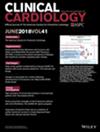Endothelial Dysfunction in Acute Myocardial Infarction: A Complex Association With Sleep Health, Traditional Cardiovascular Risk Factors and Prognostic Markers
Abstract
Background
Endothelial function (EndFx) is a core component of cardiovascular (CV) health and cardioprotection following acute myocardial infarction (AMI) treated with primary percutaneous coronary intervention (PCI).
Hypothesis
AMI patients experience endothelial dysfunction (EndDys), associated with traditional CV risk factors and sleep patterns. EndFx may also predict short and mid-term outcomes.
Methods
EndFx was assessed in 63 patients (56.2 ± 7.6 years) using the Endothelium Quality Index (EQI). Sleep quality and quantity were evaluated using objective (actigraphy) and subjective (Pittsburgh Sleep Quality Index questionnaire) measures. Cardiorespiratory fitness was quantified through the 6-min walking test. Cardiac function was assessed using the left ventricular ejection fraction.
Results
Following AMI, patients tended to experience EndDys (EQI = 1.4 ± 0.7). A severe EndDys was observed in 23.8% of patients (n = 15), while a mild EndDys was present in 63.49% (n = 40). Furthermore, EndDys was significantly associated with traditional CV risk factors (i.e., low physical activity level [12.8%], age [−4.2%], and smoking [−0.7%]) (R2 adjusted = 0.50, p < 0.001). Patients with EndDys had poor sleep quality (p = 0.001) and sleep efficiency (p = 0.016) compared to healthy persons. Patients with severe EndDys exhibited lower cardiorespiratory fitness compared to those with healthy EndFx (p = 0.017). Furthermore, during a follow-up period (nearly 4 months) following PCI, major adverse cardiac events were observed in four patients with severe EndDys.
Conclusions
Our results emphasize the importance of adequate sleep and an active lifestyle, notably physical activity practice, as modifiable elements to enhance EndFx, which is regarded as a predictive tool following AMI. However, other factors remain to be elucidated as predictors of CV risk.
Trial Registration
The study protocol was registered in the Pan African Clinical Trial Registry under the trial ID: PACTR202208834230748.


 求助内容:
求助内容: 应助结果提醒方式:
应助结果提醒方式:


